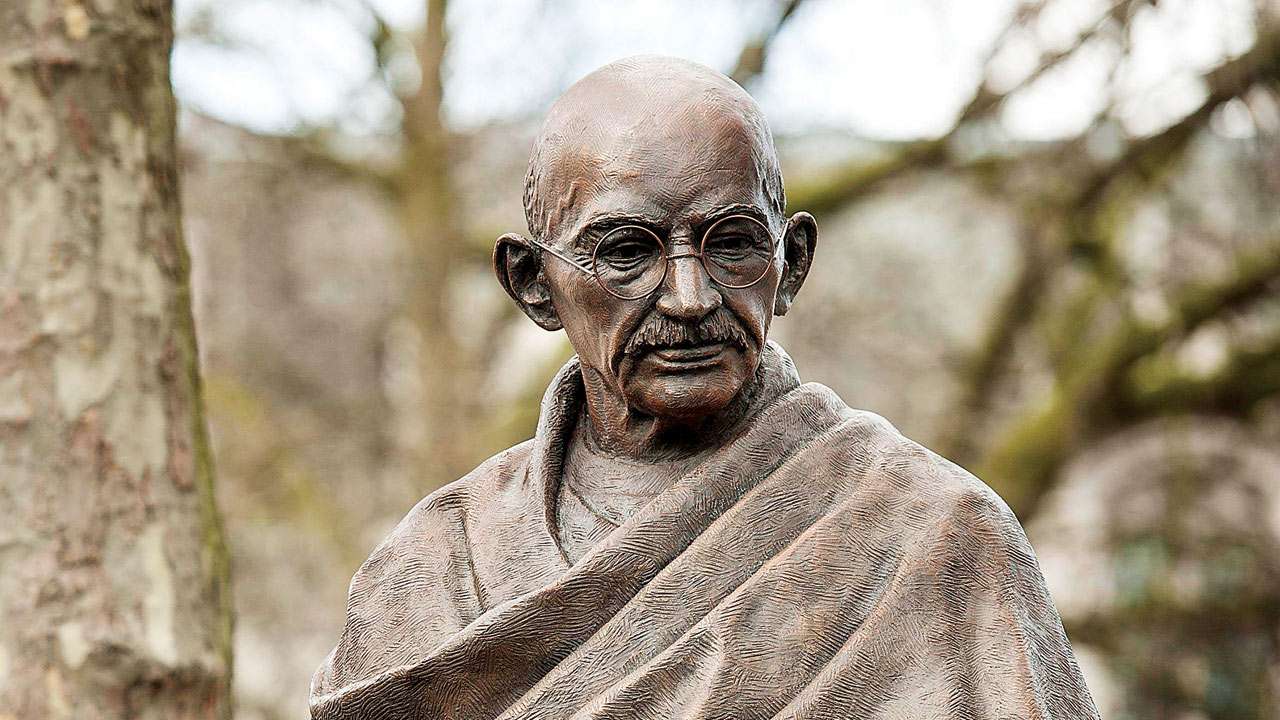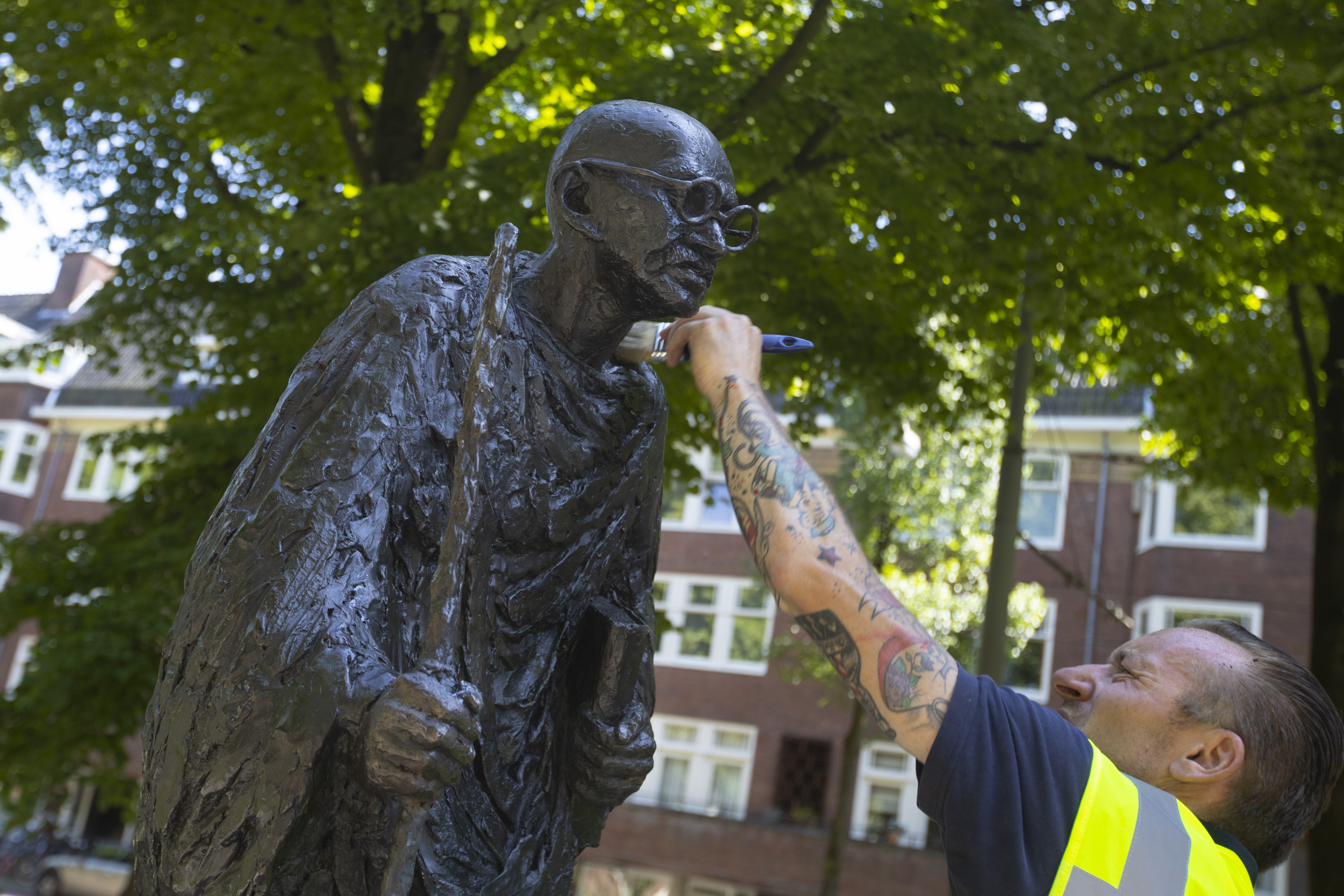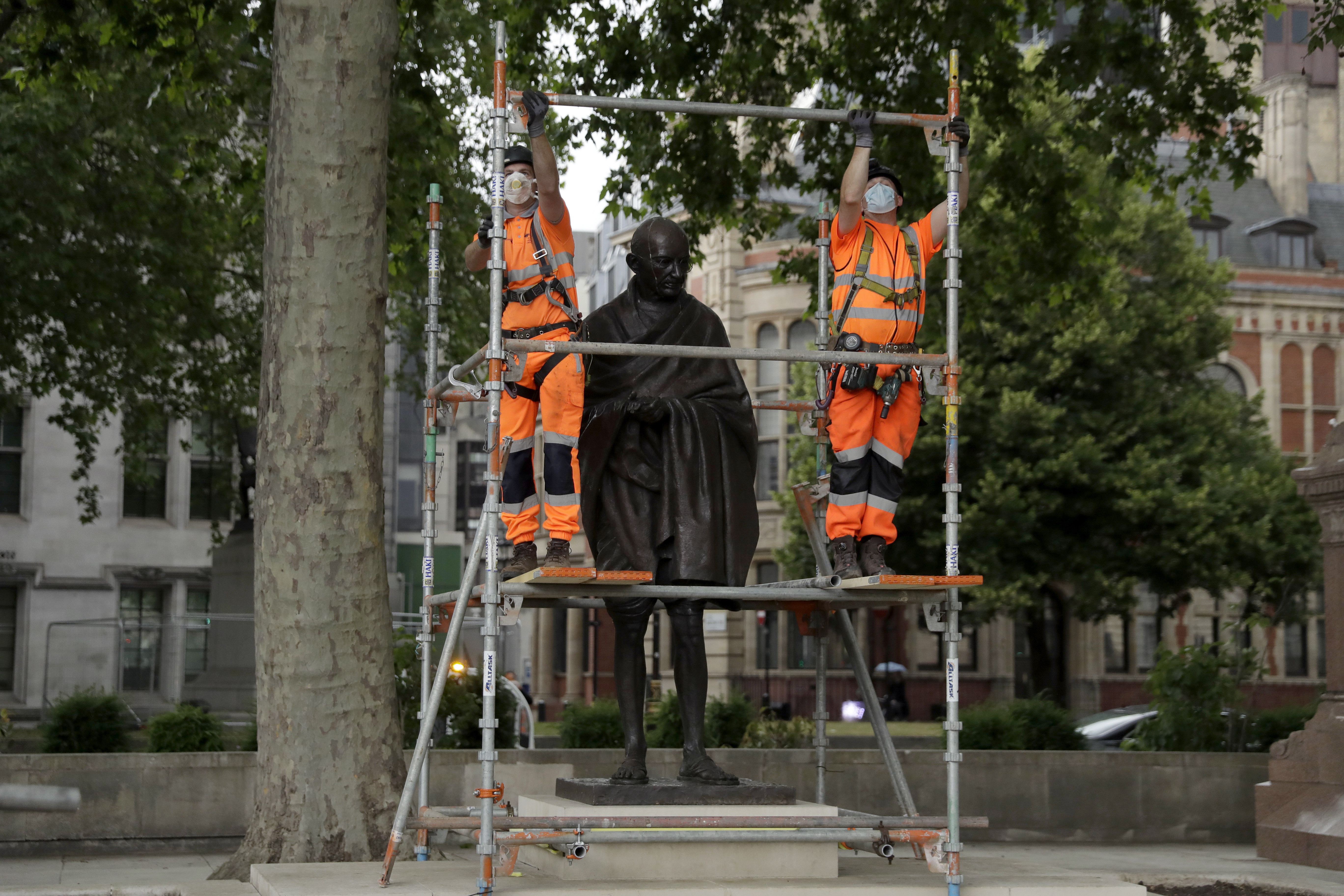
A statue of Mahatma Gandhi in Johannesburg, South Africa, September 30, 2019. /Reuters
A statue of Mahatma Gandhi in Johannesburg, South Africa, September 30, 2019. /Reuters
It started with the toppling of slave trader Edward Colston's statue in Bristol, the UK. Then came the turn of confederate monuments in the United States. Now, one of the most celebrated statesmen of the 20th century, Mahatma Gandhi, is on the statue hit list.
In Amsterdam, the statue of Mahatma Gandhi was vandalized on Wednesday night. In the UK, over 6,000 people signed an online petition to take down Gandhi's statue in Leicester. Another online petition was filed in Ottawa, Canada, calling for the removal of a Gandhi statue from the Carleton University campus. These petitions describe Gandhi, an Indian independence leader known for his non-violent movement against the British colonial rule, a racist, who called Africans "savages" and "inferior to Indians" during his over two-decade-long stay (1893-1914) in Johannesburg, South Africa.

A worker applies a coat of wax to the bronze state of Mahatma Gandhi after removing red paint in Amsterdam, June 17, 2020. /AP
A worker applies a coat of wax to the bronze state of Mahatma Gandhi after removing red paint in Amsterdam, June 17, 2020. /AP
"Personally, I am very sad that the statues are being removed because of all the wrong reasons," Tushar Arun Gandhi, Mahatma Gandhi's great-grandson, reacted to these developments while speaking to CGTN Digital. "I am also not a big fan of cult statues. If removing statues help the cause they seem to be subscribing to, then absolutely remove them," he added.
"If Bapu (Gandhi) was here, he would have supported these petitions and said, 'Please remove my statues.'"
It isn't the first time Gandhi's views on race have come under the lens. In December 2018, his statue was removed from the University of Ghana after protests by students and staff.

Workers put up a protective screen around the statue of Mahatma Gandhi in Parliament Square ahead of expected rival demonstrations by anti-racism and far-right protesters in London, June 12, 2020. /AP
Workers put up a protective screen around the statue of Mahatma Gandhi in Parliament Square ahead of expected rival demonstrations by anti-racism and far-right protesters in London, June 12, 2020. /AP
Revered but racist?
In a book titled "The South African Gandhi: Stretcher-Bearer of Empire," Ashwin Desai and Goolam Vahed, professors at the University of Johannesburg and the University of KwaZulu Natal, reveal how Gandhi kept the Indian freedom struggle "separate from that of Africans and coloreds even though the latter were also denied political rights on the basis of color and could also lay claim to being British subjects."
In 1893, Gandhi moved to Johannesburg at the age of 23. The same year, he wrote to the Natal parliament: "General belief seems to prevail in the Colony that the Indians are a little better, if at all, than savages or the Natives of Africa."
In a 1904 letter to a health officer in Johannesburg he said: "Must withdraw Kaffirs (a derogatory term for Africans in the country)" from the "Coolie Location," where a large number of Africans lived alongside Indians. "About the mixing of the Kaffirs with the Indians, I must confess I feel most strongly."
"We're not really taught that history because in the larger aspect, Gandhi — the man we know to be Gandhi today — has been whitewashed in a way to keep a certain element of his story hidden," Kenneth Aliu, a former Carleton University student who called for the statue's removal in 2017, told CBC News.
But his great-grandson blames young Gandhi's inexperience for his lack of political correctness.
"Everything written in the book is true, there's no doubt about it. But it talks about a very narrow period. Those were formative years of Gandhi. He said all that because of his lack of world view at that time," said his great-grandson, adding "At that point in his life, he wasn't aware of the world. When he went out of Rajkot [in the Indian state of Gujarat] from a very orthodox Hindu family, which practiced untouchability – all the things we call racism today were prevalent at that time."

Mohandas Karamchandra Gandhi (C) with workers in his law office in Johannesburg, South Africa, 1902. /AP
Mohandas Karamchandra Gandhi (C) with workers in his law office in Johannesburg, South Africa, 1902. /AP
Leicester East MP Claudia Webbe has labeled the petitions as "a distraction" to the Black Lives Matter movement. "[Gandhi] was part of creating a movement in the same way that Martin Luther King created a movement," she told the BBC.
In 1959, 11 years after Gandhi was assassinated, Martin Luther King Jr. visited the villa in Mumbai where Gandhi lived in the 1920s.
"[King] was booked in a very good hotel. But he said, 'I am not going anywhere else. I am going to stay here, because I am getting vibrations of Gandhi,'" Usha Thakkar, honorary secretary of Mani Bhavan Gandhi Sangrahalaya in Mumbai, told NPR in a 2019 interview. Soon after, Martin Luther King announced his decision to adopt Gandhi's method of civil disobedience.
"I would like to ask those who are calling Bapu [Gandhi] racist – were Nelson Mandela and Martin Luther King Jr. fools because they followed Gandhi's principles in fighting for the rights and freedom of the African people around the world – were they so naïve that they revered a racist man? They must answer," said Tushar Arun Gandhi.
"Today we criticize. Many people say he was Mahatma [saint], how could he have weaknesses? Being a Mahatma is all about realizing your weakness and accepting your mistakes. If you only focus on the first few years of his life in South Africa, then you are ignoring his entire life's work."
But who gets to judge Gandhi's legacy? Protesters on a mission to remove his statues or historians who have analyzed his work and life for decades? And where does it stop and with whom? In a free fall, will there be a last statue standing?